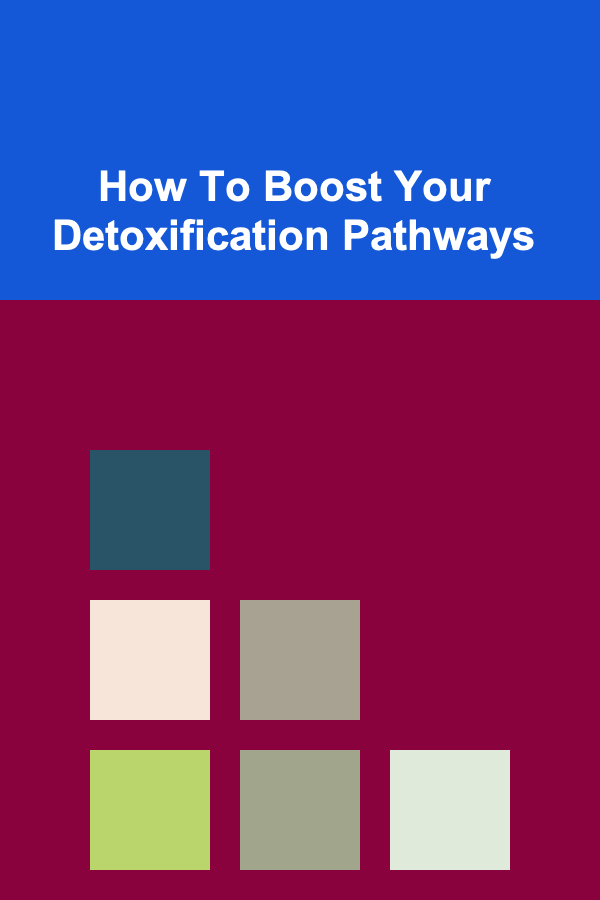
How To Boost Your Detoxification Pathways
ebook include PDF & Audio bundle (Micro Guide)
$12.99$8.99
Limited Time Offer! Order within the next:

Detoxification is a vital process for maintaining the body's health and functionality. Our bodies are constantly exposed to toxins---whether from food, air, water, or environmental pollutants---which can accumulate over time. Effective detoxification helps eliminate these harmful substances, reducing the burden on our organs and enhancing overall wellness. Understanding how to support and boost detoxification pathways is crucial for maintaining long-term health.
In this article, we will explore the body's natural detoxification systems, the importance of optimizing these pathways, and practical strategies to help promote detoxification. We will cover the science behind detoxification, the organs involved, and how diet, lifestyle, and other factors can influence the body's detox processes.
The Science Behind Detoxification
Detoxification refers to the process by which the body removes toxins---substances that are harmful to its proper functioning. The body's detox pathways involve a series of complex biochemical processes that occur primarily in the liver, kidneys, lungs, digestive system, and skin. These organs and systems work together to neutralize, process, and eliminate toxins from the body.
Toxins come in various forms, such as chemicals, heavy metals, by-products of metabolism, and environmental pollutants. The liver plays a central role in detoxification by breaking down these substances into less harmful compounds. Once processed, these waste products are excreted through the kidneys, intestines, lungs, and skin.
Key Detoxification Organs
- Liver: The liver is the body's main detox organ, responsible for filtering the blood and neutralizing harmful substances. It uses enzymes to transform toxins into water-soluble compounds that can be easily excreted.
- Kidneys: These organs filter the blood and remove waste through urine. They also help regulate fluid and electrolyte balance, which is essential for proper detoxification.
- Lungs: The lungs expel volatile toxins, such as carbon dioxide, through the process of respiration. Deep breathing helps in the expulsion of waste gases.
- Digestive System: The intestines and colon play an essential role in detoxification by processing and eliminating solid waste. The digestive system also houses a significant portion of the body's immune system.
- Skin: The skin, through sweat, can release toxins, particularly heavy metals and other waste products.
These systems work in harmony, but their effectiveness can be influenced by various factors, including diet, hydration, stress, sleep, and environmental exposures.
The Role of Detoxification Pathways in Health
Efficient detoxification is crucial for optimal health. When toxins accumulate in the body and detoxification pathways become overwhelmed, it can lead to a range of issues, such as:
- Chronic fatigue: A buildup of toxins can impair cellular energy production, leading to feelings of tiredness and lethargy.
- Skin conditions: Accumulated toxins can manifest in the skin, causing acne, rashes, or other irritations.
- Digestive issues: A toxic overload can affect gut health, leading to bloating, constipation, or diarrhea.
- Hormonal imbalances: Toxins can interfere with hormonal regulation, leading to conditions like PMS, infertility, or thyroid issues.
- Weakened immune function: Toxins can suppress the immune system, making the body more susceptible to illness.
Supporting the body's detoxification pathways helps reduce the burden on these systems, enhances overall functioning, and promotes better health. Now, let's explore how to optimize detoxification.
Strategies to Boost Detoxification Pathways
There are several ways to support and boost the body's detoxification pathways. These include dietary changes, lifestyle adjustments, and other natural methods that help enhance the body's ability to eliminate toxins.
1. Hydrate Properly
Water is essential for every aspect of detoxification. Adequate hydration supports kidney function, helps flush out waste products, and assists in the removal of toxins through the digestive system. Without sufficient water, the kidneys can struggle to filter waste effectively, leading to toxin buildup.
How to improve hydration:
- Aim to drink at least 8 glasses (about 2 liters) of water per day. This can vary based on your activity level, climate, and individual needs.
- Include water-rich foods in your diet, such as fruits and vegetables like cucumbers, watermelon, and oranges.
- Herbal teas and infusions (like dandelion or ginger tea) can support liver and kidney detoxification while adding variety to your hydration routine.
2. Support Liver Health
The liver is the primary organ involved in detoxification. Therefore, maintaining liver health is critical for boosting detoxification pathways. The liver processes toxins, converts them into water-soluble compounds, and prepares them for elimination through the intestines and kidneys.
How to support liver health:
- Eat liver-supportive foods: Incorporate foods that support liver function, such as cruciferous vegetables (broccoli, kale, Brussels sprouts), beets, and garlic. These foods contain compounds that enhance the liver's ability to process toxins.
- Increase antioxidant intake: Antioxidants like vitamin C, vitamin E, and selenium protect the liver from oxidative damage caused by free radicals. Berries, nuts, seeds, and citrus fruits are excellent sources of antioxidants.
- Consider liver herbs: Certain herbs, such as milk thistle, dandelion root, and turmeric, are known for their liver-supportive properties. These herbs can help enhance liver detoxification and regeneration.
3. Incorporate Fiber into Your Diet
Fiber plays a crucial role in detoxification, particularly in supporting the digestive system. It helps move waste through the intestines, promotes regular bowel movements, and prevents constipation, which can lead to toxin buildup. Fiber also binds to certain toxins and helps eliminate them from the body.
How to increase fiber intake:
- Eat fiber-rich foods: Include whole grains, legumes, vegetables, fruits, and seeds in your diet. These foods provide both soluble and insoluble fiber, which support digestion and detoxification.
- Consider psyllium husk: Psyllium is a natural source of soluble fiber that can help promote bowel regularity and support detoxification.
4. Engage in Regular Physical Activity
Exercise is an effective way to support detoxification. When you exercise, you increase circulation, enhance lymphatic drainage, and promote sweating, all of which help eliminate toxins. Physical activity also supports the health of your digestive system and boosts overall metabolic function.
How to incorporate exercise:
- Include a mix of aerobic and strength training exercises: Activities such as walking, running, cycling, yoga, and strength training are beneficial for overall health and detoxification.
- Get your lymph moving: Lymphatic drainage helps remove waste products from the body. Practices such as rebounding (jumping on a trampoline) or dry brushing can stimulate lymph flow.
5. Get Enough Sleep
Sleep is crucial for detoxification, as the body's detox processes primarily occur during rest. The liver and other detox organs are especially active during the night, so a good night's sleep is essential for allowing these systems to function optimally.
How to improve sleep quality:
- Maintain a consistent sleep schedule: Aim to get 7-9 hours of quality sleep each night. Consistency in your sleep patterns helps regulate your circadian rhythm.
- Create a sleep-friendly environment: Ensure your bedroom is dark, cool, and quiet to promote restful sleep. Limit exposure to screens before bedtime to reduce blue light interference.
6. Reduce Exposure to Toxins
While the body is constantly detoxifying, reducing your exposure to toxins in the first place can help lighten the load on your detox pathways. Environmental pollutants, chemicals in food, and household products can all contribute to toxin accumulation.
How to reduce toxin exposure:
- Eat organic foods: Whenever possible, choose organic produce to avoid pesticides and herbicides.
- Limit processed foods: Highly processed foods often contain artificial additives, preservatives, and chemicals that can burden the body's detox systems.
- Avoid synthetic chemicals: Minimize the use of personal care products and household cleaners that contain harmful chemicals. Opt for natural alternatives.
7. Use Saunas and Detox Baths
Sweating is one of the body's natural ways of eliminating toxins. Regular sauna sessions or detox baths can help you sweat out harmful substances while supporting skin health.
How to use saunas and detox baths:
- Try infrared saunas: These saunas use infrared heat to penetrate deeper into tissues and promote detoxification through sweating.
- Take detox baths: Epsom salt baths, with added magnesium, can help relax muscles, promote sweating, and support detoxification. You can also add essential oils like lavender or eucalyptus for added relaxation.
8. Practice Mindful Breathing and Meditation
Mindful breathing exercises and meditation can activate the parasympathetic nervous system, which is essential for promoting detoxification. Deep breathing helps improve oxygen flow, encourages lymphatic drainage, and supports relaxation, which is crucial for optimal detox function.
How to practice mindful breathing:
- Engage in deep breathing: Try deep belly breathing, in which you inhale deeply through your nose, expanding your diaphragm, and exhale fully through your mouth. Aim for several minutes of deep breathing each day.
- Practice meditation: Incorporating meditation into your daily routine can help reduce stress, promote detoxification, and improve overall well-being.
Conclusion
Boosting your detoxification pathways is a multifaceted approach that involves supporting the liver, kidneys, digestive system, and other organs involved in detox. Through proper hydration, diet, exercise, sleep, and mindfulness, you can optimize these pathways and enhance the body's ability to eliminate toxins efficiently. By adopting a holistic approach to detoxification, you not only support the body's natural processes but also contribute to long-term health and vitality.
Reading More From Our Other Websites
- [Home Budget 101] How to Increase Your Income and Improve Your Home Budget
- [Personal Care Tips 101] How to Use Hair Gel for a Retro, Classic Hairstyle
- [Sewing Tip 101] Hidden Gems: Where to Find Unique and Sustainable Fabrics
- [Digital Decluttering Tip 101] The Ultimate Guide to Unsubscribing from Unwanted Emails in 5 Simple Steps
- [Home Staging 101] How to Use Artwork and Accessories to Enhance Your Staging
- [Personal Finance Management 101] How to Improve Your Credit Score Over Time
- [Organization Tip 101] DIY Tips for Updating Your Kitchen and Bathroom on a Budget
- [Personal Financial Planning 101] How to Master The Cash Envelope System for Debt Reduction and Budgeting Success
- [Soap Making Tip 101] From Classic to Contemporary: A Chronological Guide to the Best Soap-Making Guides
- [Home Family Activity 101] How to Make a DIY Indoor Carnival

How to Build a Checklist for Discussing Profit Sharing and Financial Arrangements in Partnerships
Read More
How to Organize Kids' Toys Using the Toy Rotation Method
Read More
How to Research the Role of Genomics in Agriculture
Read More
How to Use Landscaping to Boost Your Home's Security
Read More
How To Develop a Yoga Practice for Seniors
Read More
How to Track Medical Expenses for Family Members
Read MoreOther Products

How to Build a Checklist for Discussing Profit Sharing and Financial Arrangements in Partnerships
Read More
How to Organize Kids' Toys Using the Toy Rotation Method
Read More
How to Research the Role of Genomics in Agriculture
Read More
How to Use Landscaping to Boost Your Home's Security
Read More
How To Develop a Yoga Practice for Seniors
Read More